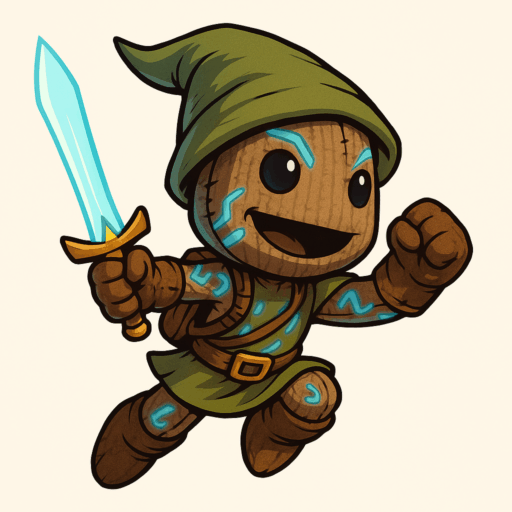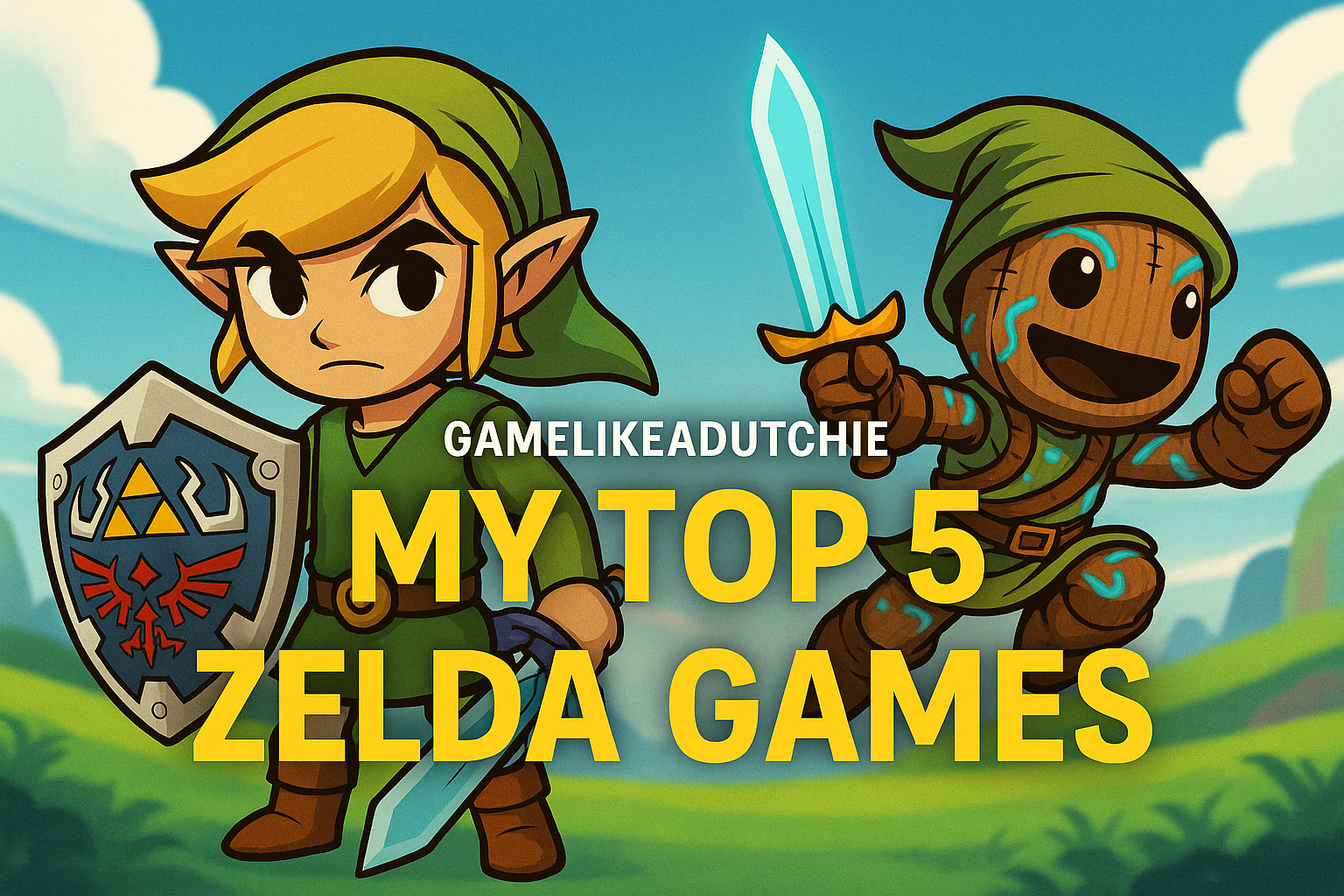Introduction: A Life Through Zelda
Growing up in the ’90s, Zelda wasn’t just a game series — it was a rite of passage. From pixelated puzzles to massive open worlds, each game marked a new chapter in my life. This list ranks my top five Zelda games based on gameplay, innovation, personal milestones, and how each one shaped my experience as a gamer.
#1 – Ocarina of Time (N64 / 3DS)
Ocarina of Time wasn’t just a leap forward — it was a catapult. I first truly experienced it through the 3DS remake, and even then, it blew me away.
The story follows Link as he travels across two timelines to stop Ganondorf from conquering Hyrule. As a child, he solves forest riddles and uncovers secrets. As an adult, he faces twisted temples and lost time. Each temple brings fresh puzzles and unforgettable music — especially the Forest and Shadow Temples.
Beyond its story, the game revolutionized 3D gaming. It introduced Z-targeting, beautiful music, cinematic cutscenes, and an open world that felt alive. Every element pushed the N64 to its limits, making it feel like a fully realised fantasy world.
Even now, Ocarina stands tall — not because it was first, but because it still plays like a dream.
#2 – Breath of the Wild (Wii U)
While most experienced it on the Switch, I dove into Breath of the Wild on the Wii U — and it didn’t disappoint.
From the start, you feel true freedom. No guides. No rigid path. Just you, a broken kingdom, and a mission to stop Calamity Ganon. The main story is broken into memories you must rediscover. Zelda’s struggle, Link’s fall, and the Divine Beasts all unravel at your pace.
What makes it stand out is the physics-based gameplay. Whether you’re shield-surfing, experimenting with fire and wind, or climbing mountains just to see what’s there — you create your own story. The shrine system replaces dungeons with over 100 mini-challenges, each offering clever twists.
Breath of the Wild rewrote the Zelda formula. It returned power to the player — and in doing so, redefined the open-world genre.
#3 – Majora’s Mask (N64 / 3DS)
Majora’s Mask is bold, haunting, and beautiful. I played the 3DS remake and found it more emotional than any other Zelda title.
Set in the parallel world of Termina, Link has just 72 in-game hours to stop the moon from crashing. You repeat this cycle using your ocarina, slowly piecing together a plan to save everyone. But not all can be saved — and that’s what makes it hit hard.
The game’s greatest strength is its transformation masks. Each lets you become something new: a Deku scrub, a Goron warrior, or a Zora musician. They’re not just tools — they’re characters with pasts, regrets, and unfinished stories.
Every NPC has a schedule. Every interaction matters. Unlike any other Zelda game, Majora’s Mask makes the world feel truly alive — and heartbreakingly fragile.
#4 – Twilight Princess (Wii / GameCube)
Twilight Princess brought grit and edge to Zelda. I played it on the Wii, and it felt like the perfect blend of tradition and innovation.
Link starts off as a rancher but is soon pulled into the Twilight Realm. There, he transforms into a wolf, gaining the ability to sense spirits and follow scent trails. These sequences feel completely different yet tie smoothly into the game’s darker tone.
The story introduces Midna — sarcastic at first but deeply complex. Her bond with Link adds emotional weight, especially during the game’s final act. Ganondorf returns as a villain, but Midna’s arc ends up stealing the spotlight.
Twilight Princess’s dungeons are among the best in the series. The Snowpeak Ruins, in particular, turns a haunted mansion into a full-on action puzzle. The visuals, though a product of their time, still deliver a rich atmosphere full of shadows and mystery.
#5 – Wind Waker (GameCube)
Wind Waker was one of my first GameCube titles. At first glance, the cel-shaded art seemed aimed at kids — but then it stunned everyone.
You set sail as a young Link searching for his kidnapped sister. Along the way, you meet pirates, uncover sunken cities, and discover that the Great Sea is the flooded remains of old Hyrule. That twist alone reshaped the entire Zelda timeline.
Sailing across islands, solving environmental puzzles, and upgrading your ship all feel fluid and rewarding. And while the game received criticism for its long sailing segments, they also gave it a unique rhythm — one of calm exploration and big payoffs.
Tetra’s reveal and the King of Red Lions storyline add depth to what at first feels like a lighthearted game. By the end, Wind Waker proves it’s not just visually bold — it’s emotionally rich.
Honorable Mentions
Skyward Sword: Strong story and swordplay, but the over-explaining and interruptions made it feel too guided. Although the HD version was a massive improvement.
Oracle of Seasons: A Game Boy Color classic that combined puzzle-solving with seasonal changes and tight combat.
Tears of the Kingdom: Still exploring it. So far, it feels like a worthy sequel with creative mechanics. Too early to rank — but it’s close.
Bonus: Egoraptor’s Zelda Sequelitis Video
Arin Hanson’s Sequelitis broke down how Zelda’s design changed over time. He argued that older games like A Link to the Past taught players through discovery, while newer ones relied too much on tutorials.
He wasn’t wrong. Games like Ocarina of Time introduced story complexity but often slowed the pacing with excessive guidance. It’s no surprise Breath of the Wild reversed course, offering freedom and trust from the beginning.
His video shaped how many of us critique Zelda today — and its legacy echoes in how we evaluate the series’ growth.
Zelda Series FAQ (2025)
| Question | Answer |
|---|---|
| What’s the best Zelda game for newcomers? | Breath of the Wild offers the most freedom and accessibility. |
| Is Ocarina of Time still worth playing today? | Yes — especially the 3DS version, which improves visuals and controls. |
| How is Majora’s Mask different? | It uses a time loop system with emotional, character-driven side quests. |
| Does Zelda have a consistent timeline? | Sort of — Nintendo published one, but many fans treat it as symbolic. |
| What’s coming for Zelda’s 30th anniversary? | Nothing confirmed yet, but rumors suggest remasters or a new title. |
Final Thoughts
Zelda isn’t just a franchise — it’s a mirror of how gaming evolves. These five games stand out not just for what they did right, but for what they meant to me when I played them. They’re moments in time, just like every great adventure should be.
From sailing through open waters to traveling through time, Zelda games remind us why we play — to explore, to feel, and to remember.
What is your favourite Zelda? Feel free to leave a reply in the comments.
Enjoyed reading? Also check out our other blog posts. We f.e. made a post about: Five Reasons Why the Launch of Oblivion Remaster Is Great for the Future of Gaming but also 5 Classic PlayStation Franchises That Need a Comeback on PS5 in 2025 and explore Fortnite x Star Wars: Galactic Battle – Everything You Need to Know
GLAD


Leave a Reply